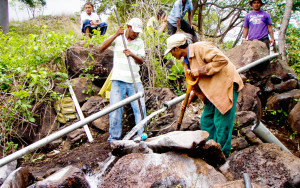
Access to clean water and sanitation is integral to global health, and yet in some parts of the world it is often considered a luxury. As of 2015, 32 percent of the global population still lack facilities such as a flush toilets or hygienic pit latrines, according to UNICEF, although 2.1 billion people have gained access to an improved form of sanitation since 1990. And while the United Nation’s millennium development target for drinking water was met in 2010, 9 percent of the global population still does not have access to safe drinking water.
Global water, sanitation and hygiene (WASH) projects focus on creating sustainable solutions to shrink this gap. Closer to home, 14 University of Colorado students who all share an interest in WASH created a two-day symposium with speakers from across the globe.
Riley Mulhern is one of the graduate students helping to plan the event, and it is Mulhern’s second year doing so. Last year the symposium was dedicated entirely to sustainable development goals that had been released by the UN. This year’s event will focus on non-residential WASH, urban WASH and market-based approaches to fund such projects.

“The goal of the symposium every year is to set up a platform for sharing and expanding that knowledge in WASH so even the unaware freshman or sophomore who is just now hearing about some of this stuff or the 30-year professional both get something out of it,” Mulhern says. “Some of that process of bringing a diverse group together is what moves the sector forward, that sense of collaboration — even if it’s with these people who are all professionals and experts, or if it’s across the spectrum — I think it provides a stepping stone for the future of WASH.”
As an undergraduate at Wheaton College, Mulhern traveled to Nicaragua for a six-month internship with Nuevas Esperanzas, an organization that focuses on water resources and food security. He lived in a village that relied on ground water that had been naturally poisoned with arsenic from the Telica Volcano. During his time there, he helped build a 3.7-kilometer pipeline to bring untainted water downstream to the community.
Mulhern views his current research on treating wastewater as a stepping stone in gaining technical skills that would allow him to do his dream work later on.
“I really want to be in some sort of field that I’m addressing issues of social justice, and to me, lack of access to water sanitation is a social justice issue,” Mulhern says. “And the solution isn’t always technical either. It isn’t always we need better technology, which is some of what we’re going to talk about at the symposium; is it a technical issue, or is it a service delivery issue, which is more social justice oriented.”

For Shaye Palagi, another member of the symposium planning committee who is getting a Ph.D. in civil engineering, her interest in WASH came during her study-abroad experience in Singapore.
“I traveled all throughout Southeast Asia, and to be honest, I used some really bad toilets, and I went to the bathroom in some really horrible places,” she says. “I’ve physically lived what it’s like, lived without adequate sanitation, but I only lived it for a week at a time. I can’t imagine living with inadequate sanitation for a lifetime. … Adequate sanitation is a human right, and for me it was realizing it is not everywhere; it’s not a given in most places of the world.”
She currently serves in the Colorado Air National Guard where she has seen the ability to drop reverse osmosis units anywhere in the world, providing safe drinking water within 48 hours. Attending, and then planning the WASH symposium is a way Palagi found to incorporate her engineering degree into a broader education.
While the process of bringing in speakers can seem like courting with little to offer — the team can only pay for some of the speakers’ travel expenses with a grant they receive from the Engineering Excellence Fund — CU Boulder’s reputation usually works.
“Our speakers come back year after year because it’s not your stuffy, wear a tie, normal conference where you have to watch what you say,” Palagi says. “We actually encourage discord in a way. We encourage people to say what they mean and get a little feisty, and the speakers really appreciate that.”
And it’s these lively discussions that are at the heart of CU’s WASH symposium. While significant progress has been made in the field over the last few decades, there’s still a long way to go. Almost one-tenth of the world’s diseases and 6 percent of all deaths could be prevented with adequate sanitation, better hygiene and improved water supply, according to the World Health Organization. While a two-day conference cannot create the solutions, the WASH symposium interjects this dialogue into students’ daily lives, exciting some to go work in the WASH sector and begin to solve these issues.
On the Bill: 2016 Colorado WASH Symposium. 9 a.m.–5 p.m. March 1-2, Sustainability, Energy and Environment Complex, 4001 Discovery Drive, Boulder. Free. colorado.edu/washsymposium/














